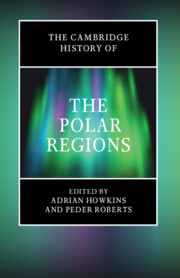Book contents
- The Cambridge History of the Polar Regions
- The Cambridge History of the Polar Regions
- Copyright page
- Contents
- Figures
- Contributors
- Acknowledgements
- Additional material
- 1 Introduction: The Problems of Polar History
- 2 ‘I Watch to See How the Land Is Changing’: An Inuit Perspective on Changing Environments and Cultural Resilience in the Western Canadian Arctic
- 3 Evolution of the Antarctic Continent and Its Ice Sheet
- 4 The Initial Peopling of the Circumpolar North
- 5 Archaeology, Politics, and Sámi Heritage
- 6 The Norse Settlement of Greenland
- 7 Russia, the First Arctic Empire, 1000–1917
- 8 The Discovery of Antarctica from Ptolemy to Shackleton
- 9 Sir John Franklin and the Northwest Passage in Myth and Memory
- 10 The Heroic Age of Antarctic Exploration, 1890 to the Present
- 11 Representing the Polar Regions through Historical Fiction
- 12 Geography, Anthropology, and Arctic Knowledge-Making
- 13 Britain’s Polar Empire, 1769–1982
- 14 Canada and the High Arctic Islands, 1880–1950
- 15 The Genesis of the Spitsbergen/Svalbard Treaty, 1871–1920
- 16 Industrial Whaling in the Arctic and Antarctic
- 17 A Historical Archaeology of the First Antarctic Labourers (Nineteenth Century)
- 18 Mining and Colonialism in the Circumpolar North
- 19 Creating the Soviet Arctic, 1917–1991
- 20 Greenland: From Colony to Self-government, 1721–2021
- 21 Cold War Environmental Knowledge in the Polar Regions
- 22 The International Geophysical Year and the Antarctic Treaty System
- 23 The First Century of US Militarization in Alaska, 1867–1967
- 24 Petroleum Development and the State in Arctic North America, 1919–1977
- 25 The Rise of Circumpolar Political Movements
- 26 The History of Polar Environmental Governance
- 27 The Antarctic Extension of Latin America
- 28 Moving Muskoxen as an Arctic Resource in the Twentieth Century
- 29 Boundaries of Place and Time at the Edge of the Polar Oceans
- 30 Re-storying from Within: Renewing Relationships Beyond the Shadows of Polar History
- 31 Conclusion: Time, and the Future of Polar History
- Index
- References
13 - Britain’s Polar Empire, 1769–1982
Published online by Cambridge University Press: 24 March 2023
- The Cambridge History of the Polar Regions
- The Cambridge History of the Polar Regions
- Copyright page
- Contents
- Figures
- Contributors
- Acknowledgements
- Additional material
- 1 Introduction: The Problems of Polar History
- 2 ‘I Watch to See How the Land Is Changing’: An Inuit Perspective on Changing Environments and Cultural Resilience in the Western Canadian Arctic
- 3 Evolution of the Antarctic Continent and Its Ice Sheet
- 4 The Initial Peopling of the Circumpolar North
- 5 Archaeology, Politics, and Sámi Heritage
- 6 The Norse Settlement of Greenland
- 7 Russia, the First Arctic Empire, 1000–1917
- 8 The Discovery of Antarctica from Ptolemy to Shackleton
- 9 Sir John Franklin and the Northwest Passage in Myth and Memory
- 10 The Heroic Age of Antarctic Exploration, 1890 to the Present
- 11 Representing the Polar Regions through Historical Fiction
- 12 Geography, Anthropology, and Arctic Knowledge-Making
- 13 Britain’s Polar Empire, 1769–1982
- 14 Canada and the High Arctic Islands, 1880–1950
- 15 The Genesis of the Spitsbergen/Svalbard Treaty, 1871–1920
- 16 Industrial Whaling in the Arctic and Antarctic
- 17 A Historical Archaeology of the First Antarctic Labourers (Nineteenth Century)
- 18 Mining and Colonialism in the Circumpolar North
- 19 Creating the Soviet Arctic, 1917–1991
- 20 Greenland: From Colony to Self-government, 1721–2021
- 21 Cold War Environmental Knowledge in the Polar Regions
- 22 The International Geophysical Year and the Antarctic Treaty System
- 23 The First Century of US Militarization in Alaska, 1867–1967
- 24 Petroleum Development and the State in Arctic North America, 1919–1977
- 25 The Rise of Circumpolar Political Movements
- 26 The History of Polar Environmental Governance
- 27 The Antarctic Extension of Latin America
- 28 Moving Muskoxen as an Arctic Resource in the Twentieth Century
- 29 Boundaries of Place and Time at the Edge of the Polar Oceans
- 30 Re-storying from Within: Renewing Relationships Beyond the Shadows of Polar History
- 31 Conclusion: Time, and the Future of Polar History
- Index
- References
Summary
In 2012, Britain’s National Environmental Research Council (NERC) proposed a 25 per cent budget cut for the British Antarctic Survey (BAS), the organization responsible for science and administration in the British Antarctic. When BAS Director Nicholas Owens learned of these proposed cuts, he ignited a political maelstrom by taking the matter straight to the Foreign Office, sidestepping NERC Director Duncan Wingham. In response, Prime Minister David Cameron pledged support for BAS and ordered the funding dispute resolved. Then the crisis worsened when Owens was suspended and temporarily replaced by Ed Hill, the director of the National Oceanographic Centre.
- Type
- Chapter
- Information
- The Cambridge History of the Polar Regions , pp. 302 - 324Publisher: Cambridge University PressPrint publication year: 2023

